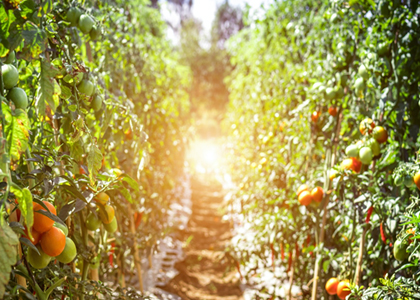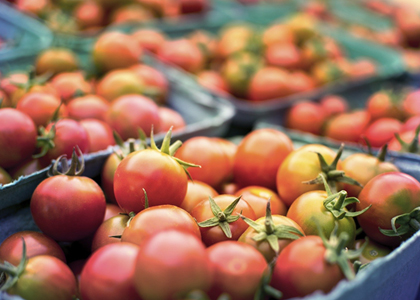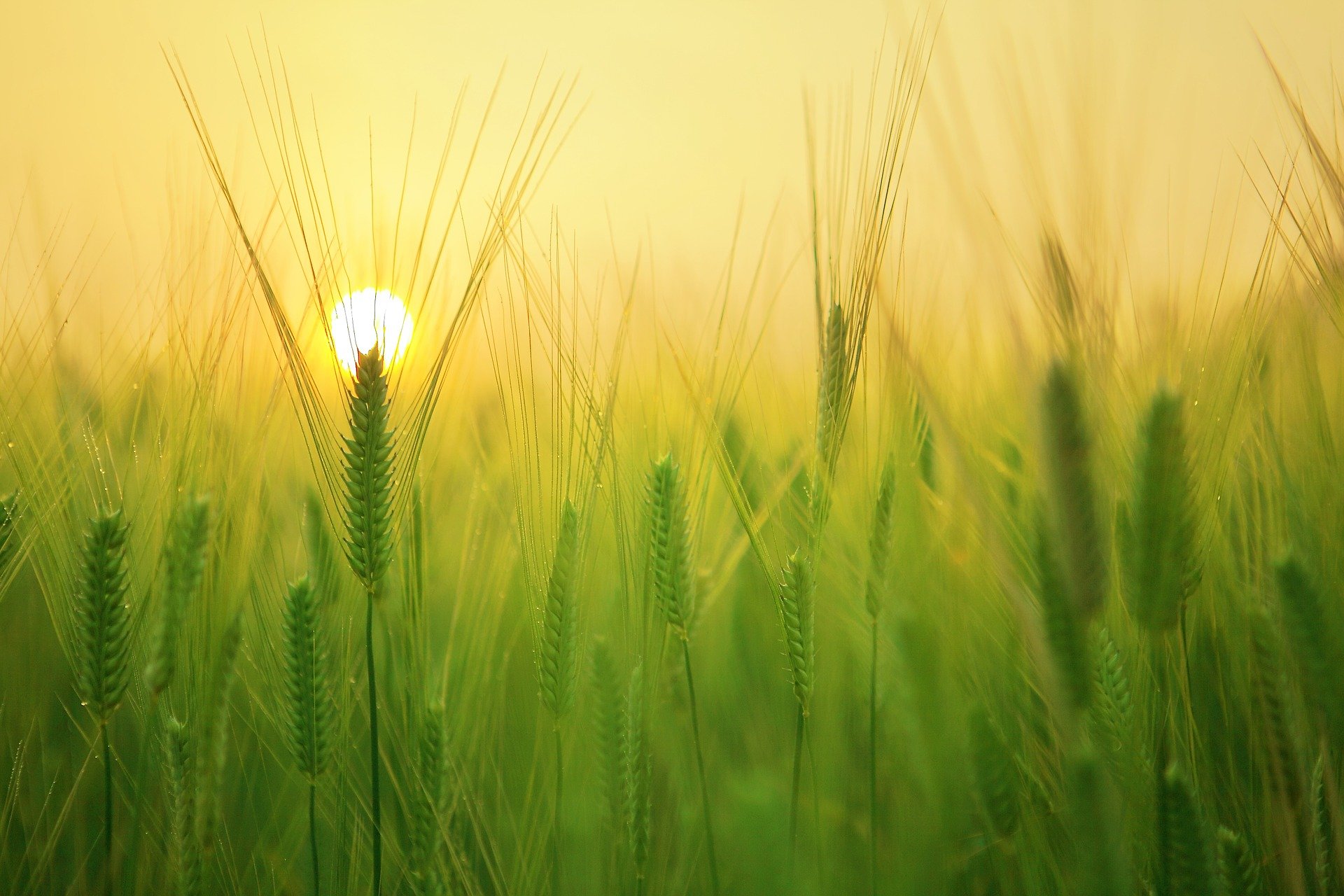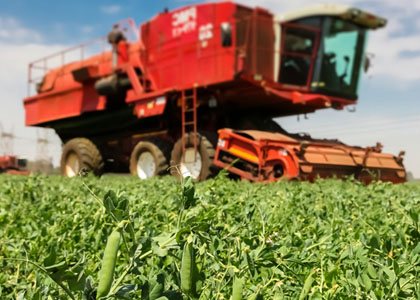Home / Blog / 4 technological innovations that are changing the face of saudi farming
SUMMARY
The next wave of agriculture in the Kingdom will no longer depend on traditional practices of simply applying water, fertilizers, and pesticides uniformly across fields and farm areas. Instead, farmers and agricultural practices will get greater yields and healthier produce despite using minimum quantities. It will also be possible to grow crops in arid and dry areas.
If you’re wondering how – take note. Technological integrations across agriculture are set to revolutionize the industry. The use of technology means that farms will be run very differently in the future. They will be more connected, automated, and informed through sensors, devices, machines, and IT that can deliver more precisely and efficiently. This means that farms such as yours stand to become more profitable, efficient, safe, and environmentally friendly.
Technological innovations in farming methodologies are opening smarter delivery systems and avenues for agricultural organizations. Whilst innovations like 3D printing of foods, cultured meat, genetic modification, and seawater agriculture are in the early stages of implementation internationally, they hold huge potential for use in Saudi.
INDEX
4 TECHNOLOGICAL INNOVATIONS THAT ARE CHANGING THE FACE OF SAUDI FARMING
According to the UN’s Food and Agriculture Organization, 70% of total freshwater drawn all over the world is used across agricultural applications. With climate change uncertainties looming over the region there is a pressing need for innovative agricultural solutions.
Especially in Saudi Arabia, with a growing population and limited natural irrigation sources, farmers need to be thinking innovatively if they want to help meet the country’s demand for food in the future.
With the country’s population projected to grow to 35.46 million in 2021, advances in technology are key to the future of Saudi farming. As a part of its larger 2030 Vision, agriculture in the Kingdom is ripe for a transformation with science and technology at its heart. Innovating farms and agricultural practices with sensors, devices, machines, and information technology can make farming businesses more profitable, efficient, safer, and environmentally friendly.

Controlled Environment Agriculture:
Controlled environment agriculture (CEA) is a system of farming that regulates certain aspects of the environment including temperature, humidity, carbon dioxide, light, and nutrient concentration in order to reduce pests and plant disease. CEA farming also increases efficiencies, crop yields and is a more sustainable way of farming.
Combining technologies like solar panels for energy efficiency, low-energy desiccant cooling, salt-tolerant edible plants, and algal biotechnology to CEA, farms can create new-generation green complexes that have the potential to produce up to 20 times the amount of crop as compared to a similar-sized soil plot.
In Saudi, controlled environment agriculture applications include the following:

- Vertical Farming
Vertical farming is crop production that grows plants in horizontal tall towers or trays often stacked up to 30 tiers high. Vertical farms use aeroponics to mist the roots of greens with nutrients, water, and oxygen, where the system runs in a closed loop. It pays to note that aeroponic irrigation uses 95% less water than field farming and 40% less than hydroponics.
Stacked agricultural farms also allow for greater monitoring of all the macro and micronutrients, enabling crops to grow in half the time as compared to in-field plants. By intersecting horticulture with engineering, food safety, data science, and nutrition, you can monitor millions of data points at every harvest. What’s more, vertical farms allow integration with machine vision, machine learning, and IoT, enabling you to take your agricultural enterprise into the future.
Vertical farms also allow for controlled seeding, germinating, growing, and harvesting, where every aspect of the growing process has been optimized to minimize and mitigate pest proliferation.
Whilst everything about the indoor environment is governed by sensors and automation, the crucial ingredient in controlled environment vertical farms is artificial lighting.
All vertical farms operating today use a type of LED lighting determined by plant requirements and need. For example, leafy greens and other vegetative crops prefer blue-spectrum lighting, whereas fruiting and flowering crops prefer the red spectrum of lighting. Each variety of plants has its own tailored lighting recipe that allows them to photosynthesize for longer periods of the day — up to 18 hours at a time. In practical terms, this means that your crop yields increase. In fact, internationally, vertical farming has been proven to produce 75 times more food per square foot than traditional farming.
Whilst most farming enterprises in the region are currently concentrating on producing perishable goods such as salad vegetables (crops that traditionally require large amounts of water), vertical farming experts believe that even staples like potatoes and wheat could eventually be grown indoors in the Kingdom.
- Greenhouses
Greenhouses are large glass or polycarbonate structures that strategically use natural lighting to facilitate crop production. By controlling variables like temperature and humidity through pad-and-fan-cooling systems, greenhouse farming in Saudi shows great potential for the sustainable growth of crops. With the automation of irrigation through digitalized systems and the mitigation of temperature extremes through cooling mechanisms, smart greenhouses are enabling farmers like yourself in growing crops such as tomatoes, cucumbers, peppers, and bedding plants.
In fact, a 44-hectare greenhouse complex in the Al-Kharj region is shaping the future of greenhouses in Saudi. It has built-in facilities to collect rainwater from the glass greenhouse roof to further facilitate irrigation needs.
- Hydroponics
Hydroponics, a subset of CEA and hydroculture is a method of growing plants without soil, using mineral nutrient solutions in a water solvent. It offers a long-term solution for Saudi where the extreme climate is a huge challenge to growing crops.
By using technology that uses solar energy to desalinate water, hydroponic methods in CEA empower you by helping you grow food anywhere. The system efficiently utilizes space, reduces transportation waste and costs, and when done right, hydroponics saves you from any agricultural losses from pests and plant diseases. In fact, smart nutrition technologies used in hydroponics have the potential to reduce the growth cycle by 50% allowing you to grow healthier crops faster.(To find out more about hydroponic uses across agriculture click here).
- Aquaponics
Aquaponics technologies, which rears fish and plants in a mutually advantageous environment, holds huge benefits for farmers in Saudi. In aquaponic farming, a sizeable tank houses a large, high-density population of fish. As the fish grow, the water that houses them is filtered using a gravity-fed technique to keep the water free of large particulate matter, such as dirt. The water is then pumped to long channels in which aquatic plants are grown. At the end of the channel, a small pump sends the water back to the fish tank. During this cycle, waste matter from the fish provides nutrients for the plants, which in turn cleans the water of toxins (such as total ammonia nitrogen [TAN]) for the fish. By cleaning the water through aquaponic farming methods, the final discharge is clear of fish toxins and is kinder to the environment.
The system is supremely efficient for farmers such as yourself, as it can produce up to eight times in yield in vegetables and fish. Aquaponic farming also retains the vast majority of the water it uses, requiring only minor refilling as little is lost to evaporation. As the majority of the water flow is mediated by gravity, aquaponics systems use much less energy. What’s more, in comparison to traditional hydroponics systems, the plants in the aquaponics are nourished by the fish, cutting costs. This method of CEA holds huge opportunities for farmers looking to grow duckweed (used to feed fish, cows, sheep, and camels) as well as barley, to reduce the imports of these crops.
As a small but growing dimension of agriculture, CEA holds huge potential for Saudi Arabia. In coastal locations in the Kingdom which have access to seawater and abundant sunlight, newly identified salt-tolerant varieties of tomatoes and green vegetables are being grown through controlled farming methodologies to great success. These farms are also making use of smart mixed irrigation systems, like harvesting fresh water from humid air, to have a lower impact on municipal supplies.

Agricultural Automation
The rise of digital agriculture and its related technologies has opened a wealth of new data opportunities. Remote sensors, satellites, and UAVs can gather information 24 hours a day over entire fields and large-scaled areas. Automated agricultural processes can monitor plant health, soil condition, temperature, humidity, etc. The generated data from sensors can help farmers gain a better understanding of the situation on the ground and get them to plan agricultural needs more efficiently.
- Remote sensors and digitalized processes
As every industry incorporates more digitalization across systems, the agriculture sector in Saudi is also perfectly positioned for digital disruption. By incorporating digital processes like precision agriculture generated through shared data, drones, sensors, and farm management software, you too can raise the level of your farming enterprise.
Sensor technologies being used across agriculture have built-in algorithms that allow you to interpret a field’s environment. Generated as statistical data, remote sensors can connect to multiple devices like satellites, weather networks, and cloud systems in real-time. This helps them process, adapt, and learn faster to deliver smarter solutions that can help you make better agricultural decisions.
The digitalization of water can also deliver huge benefits in agricultural management. Sensors in water pipes can pinpoint the site of leaks, helping to speed up repairs. Smart meters can provide valuable data to manage supply and demand. As all these technologies communicate to each other from smart devices connected through a central management system, you have a panoramic view of your whole enterprise. This gives you greater control to make informed decisions.
- Drones
Drone technology is expected to give agriculture in Saudi Arabia a high-tech makeover. Their uses across multiple applications can change the way traditional farms operate. By producing 3D maps for early soil analysis, drones can play a role in planning seed planting and in gathering data for managing plant irrigation and nitrogen levels. In fact, seeds planting through drones has shown to reduce costs by 85%. Drones can shoot pods with seeds and nutrients into the soil, faster and more efficiently than human labor. What’s more, drone use for crop spraying and irrigation has shown that aerial spraying is five times faster and more efficient through drones.
Crop monitoring and plant health assessments through aerial drone photography and drone-carried scanning devices (through visible and near-infrared light) can help track plant growth, alerting you to deficiencies much faster.
- Solar energy
Another trend in Saudi agriculture that can increase water efficiency in farming and food production is the use of solar power to generate energy for water desalination. Using solar energy to power farming organizations has the potential to supply clean water for hydroponic greenhouses, traditional rural irrigation, and urban farms.

Blockchain Technology
Whilst most people know blockchain for its application in cryptocurrency finance, the agricultural world is beginning to get to know this innovative new technology in another capacity. International uses of blockchain in agriculture show its potential with traceability and supply chains. An agricultural blockchain ledger can record and update the status of crops from planting, harvest, storage to delivery. The upside for large farming operations is that it offers a secure, immutable ledger that ensures you never lose a load – giving you the status of all your crops in real-time.
This means that blockchain’s capability of tracking ownership records and tamper- resistance can be used to solve urgent issues such as food fraud, safety recalls, supply chain inefficiency, and food traceability in the agricultural ecosystem in Saudi. The current communication framework makes traceability a time-consuming task since some involved parties are still tracking information on paper. The structure of blockchain ensures that each player along the agricultural food value chain would generate and securely share data points to create an accountable and traceable system. Vast data points with labels that clarify ownership can be recorded promptly without any alteration. As a result, the record of a food item’s journey, from farm to table, is available to monitor.
For Saudi, the uses of blockchain in agriculture go beyond ensuring food safety. It also adds value to the current market by establishing a ledger in the network and balancing market pricing. The traditional price mechanism for buying and selling relies on judgments of the involved players, rather than the information provided by the entire value chain. Giving access to data would create a holistic picture of supply and demand.
Lastly, blockchain also offers uses for resource management in tracking machinery maintenance records, or for tracking other sensors and equipment.

Genetic Editing
Genome-editing tools provide advanced biotechnological techniques that enable the precise and efficient targeted modification of an organism’s genome. Genome-editing systems have been utilized in a wide variety of plant species to characterize gene functions and improve agricultural traits.
To address future food security concerns in the Kingdom, horticulture experts and biology researchers at King Abdullah University of Science and Technology in Saudi Arabia have been working on improving crop yields and plant tolerance to biotic and abiotic stress through precise genome editing. They have been working on making crops more resilient to weather conditions, whilst trying to increase the nutrient contents of food. Scientists are also engineering crops to require less water, be sturdier, and more resilient to pest infections.
Whilst the widespread use of gene-modified seeds could be a huge boon for Saudi farmers, the practice is still in restricted use in the Kingdom. Some crops that have been improved by gene editing are being developed and tested in the field, including mushrooms with longer shelf lives, potatoes low in acrylamide (a potential carcinogen), and soybeans that produce healthier oil. However, the long-term application is still a work in process and requires more information and education to be made readily available to farmers.
It goes without saying that the future of agriculture has to be more technology dependent. With limited water resources and a growing population demanding more food, Saudi Arabia needs smart solutions that successfully take it into the future. This means you need
to be thinking about automating processes so that your farm is delivering precision agriculture that is better informed through supported cloud data and technologies. Incorporating advancements to your enterprise will not only speed up processes so that you continue to remain profitable, but they are also more sustainable in the long-term.
For more information on agricultural technological innovations, their scope, and potential, get in touch with Agri or email hello@agri.com.sa.












